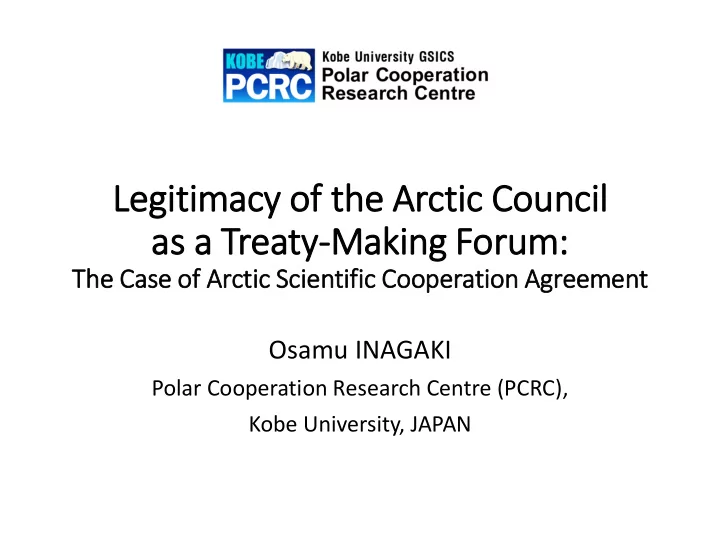

Legitimacy of f the Arctic Council as a Treaty-Making Foru rum: Th The Case of Arctic ic Sc Scie ientif ific ic Cooperatio ion Agreement Osamu INAGAKI Polar Cooperation Research Centre (PCRC), Kobe University, JAPAN
1. Introduction (1) Two key instruments in my presentation: • Agreement on Enhancing International Arctic Science Cooperation signed by Ministers on 11 May 2017 • Addendum to the Observer Manual for the Subsidiary Bodies adopted in the SAOs meeting in October 2015
1. Introduction (2) The purpose of this presentation: This presentation explores the effect of the addendum to the observer manual on the legitimacy of the Arctic Council as a treaty making forum by examining actual application of the addendum to the negotiation process of the scientific cooperation agreement within the Scientific Cooperation Task Force (SCTF).
2. Addendum to the Observer Manual adopted in October 2015 “2) MEETING PARTICIPATION Further to Rule 38 of the Arctic Council Rules of Procedure and as provided for in Section 7.4 in the Observer Manual for Subsidiary Bodies, during a meeting of an Arctic Council subsidiary body, the Chair should make every effort to provide interested Observers with an opportunity to: •Make statements after Arctic States and Permanent Participants, and take part in discussion concerning projects to which the Observer intends to contribute or has contributed; •Present written statements; •Submit relevant documents.”( Observer Manual, p. 12)
Rule 38 of RoP (2013) “38. The primary role of Observers is to observe the work of the Arctic Council. Observers contribute through their engagement in the Arctic Council primarily at the level of working groups. In meetings of the Arctic Council’s subsidiary bodies to which Observers have been invited to participate, Observers may, at the discretion of the Chair, make statements after Arctic States and Permanent Participants, present written statements, submit relevant documents and provide views on the issues under discussion. Observers may also submit written statements at Ministerial meetings. …”
Observer Manual 7.4 “7.4 DISCUSSION, STATEMENTS AND SPEAKING ORDER The Chair should make every effort to ensure that discussions on agenda items proceed in a methodical and regular manner that encourages the exchange of information. Observers may, at the discretion of the Chair, make statements, present written statements, submit relevant documents and provide views on the issues under discussion. On any agenda item under discussion, the Chair should ensure that speakers from Arctic State and Permanent Participant delegations have first had an opportunity to intervene and discuss the agenda item, before considering opening the discussion to further interventions from all delegations to the meeting, including speakers from Observer delegations. During the discussion of any matter, a representative of an Arctic State or Permanent Participant may rise to a point of order and the point of order shall be decided immediately by the Chair .”
3. Negotiation Process of the Scientific Cooperation Agreement (1) 8 th Ministerial meeting (May 2013): Establishment of the SCTF 1 st meeting (Stockholm, December 2013) 2 nd meeting (Helsinki, April 2014) 3 rd meeting (Reykyavik, May 2014) 4 th meeting (Tromsø, September-October 2014) 5 th meeting (Oslo, February 2015) 9 th Ministerial meeting (May 2015): Extension of the Mandate 6 th meeting (Copenhagen, August 2015) Adoption of the Addendum (October 2015) 7 th meeting (Reykjavik, December 2015) 8 th meeting (Washington DC, March 2016) 9 th meeting (Ottawa, July 2016): ad referendum agreement 10 th Ministerial meeting (May 2017) : Signature of the Agreement
3. Negotiation Process of the Scientific Cooperation Agreement (2) US Chairmanship Commencement (May 2015) “ it is vitally important that the Council strengthen its cooperation and engagement with accredited observers”; “Re -examine … the rules that apply to [observers] once admitted.” 6 th meeting (Copenhagen, August 2015) ・ “some Observers gave statements and underlined the importance that non - Arctic States would somehow benefits under the agreement.” Adoption of the Addendum (October 2015) 7 th meeting (Reykjavik, December 2015) ・ France, German and the United Kingdom ’ s Joint Statement ・ Poland's non-paper 8 th meeting (Washington DC, March 2016) ・ Japan’s Statement ・ Poland’s Statement 9 th meeting (Ottawa, July 2016): ad referendum agreement “The uniqueness of the process of negotiating this document was that the Permanent Participants and the Observers were given an opportunity to take part in preparing concrete provisions of this Pan-Arctic intergovernmental document. ” (Vladimir Barbin, Russian Co-Chair of the SCTF)
4 . Final Text of the Scientific Cooperation Agreement Though the agreement does not have accession clause, its several provisions recognize the non- Arctic states’ interest: • 11th Paragraph of the Preamble • The concept “participant” in Article 1 (Art. 4, Art. 5 and Art.6 para. 2) • Article 6(2), Article 7(1) • Review meeting (Art. 12) • Cooperation with non-Parties (Art. 17)
5. Conclusion Allowing interested observer states to be substantially involved in the negotiation and the their interest to be incorporated in the final text of the agreement, the addendum to the Observer Manual had a positive effect on the legitimacy of the Arctic Council as a treaty-making body.
Thank you for your listening !
Recommend
More recommend